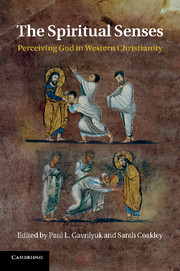Book contents
- Frontmatter
- Contents
- Contributors
- Foreword
- Abbreviations
- Introduction
- Chapter 1 Origen of Alexandria
- Chapter 2 Gregory of Nyssa
- Chapter 3 Augustine
- Chapter 4 Gregory the Great
- Chapter 5 Pseudo-Dionysius the Areopagite
- Chapter 6 Maximus the Confessor
- Chapter 7 Alexander of Hales
- Chapter 8 Thomas Gallus
- Chapter 9 Bonaventure
- Chapter 10 Thomas Aquinas
- Chapter 11 Late medieval mystics
- Chapter 12 Nicholas of Cusa
- Chapter 13 Jonathan Edwards and his Puritan predecessors
- Chapter 14 John Wesley
- Chapter 15 Karl Rahner and Hans Urs von Balthasar
- Chapter 16 Analytic philosophers of religion
- Select bibliography
- General index
- Index of select biblical references
- References
Chapter 12 - Nicholas of Cusa
Published online by Cambridge University Press: 05 December 2011
- Frontmatter
- Contents
- Contributors
- Foreword
- Abbreviations
- Introduction
- Chapter 1 Origen of Alexandria
- Chapter 2 Gregory of Nyssa
- Chapter 3 Augustine
- Chapter 4 Gregory the Great
- Chapter 5 Pseudo-Dionysius the Areopagite
- Chapter 6 Maximus the Confessor
- Chapter 7 Alexander of Hales
- Chapter 8 Thomas Gallus
- Chapter 9 Bonaventure
- Chapter 10 Thomas Aquinas
- Chapter 11 Late medieval mystics
- Chapter 12 Nicholas of Cusa
- Chapter 13 Jonathan Edwards and his Puritan predecessors
- Chapter 14 John Wesley
- Chapter 15 Karl Rahner and Hans Urs von Balthasar
- Chapter 16 Analytic philosophers of religion
- Select bibliography
- General index
- Index of select biblical references
- References
Summary
Introduction
In De quaerendo Deum, Nicholas of Cusa – at the origin of a mystical ascent – writes of the way in which an external object is ‘taken up into consciousness’, from the five external senses, through the ‘common sense’, to the imagination and the intellect. In De visione Dei – when depicting the culmination of a mystical ascent – Cusa used this same theme of the ordo cognoscendi in order to establish his claim both for a visio Dei and for only a pregustus thereof.
In these two texts and passages, I will suggest, an important confluence obtains. In the first, Cusa presents an Aristotelian model of the nature of sensible cognition, or aesthetic. In the second, Cusa presents a neo-Platonic, and specifically Origenist, aesthetic. Cusa, I will suggest, inherits and synthesizes the Aristotelian doctrine of the common sense (sensus communis) and inner senses (sensus interiores) with the Origenist doctrine of the spiritual senses (sensus spirituales). These aesthetics, I will suggest, respond to distinct experiential exigencies, propose distinct faculties and imagine distinct ends of cognition, and thus are incongruent. For this reason, a disaggregation of these doctrines is essential to a comprehension of Cusa's theological aesthetics. Once their particular character and role is set out, we will be able to appreciate the way in which Cusa establishes their coincidentia within his account of the theological significance of sensibility. For in Cusa's superposition of an Origenist theological aesthetic over an Aristotelian theory of cognition, neither escapes in its original, Aristotelian or Origenist, form.
- Type
- Chapter
- Information
- The Spiritual SensesPerceiving God in Western Christianity, pp. 210 - 223Publisher: Cambridge University PressPrint publication year: 2011
References
- 2
- Cited by



